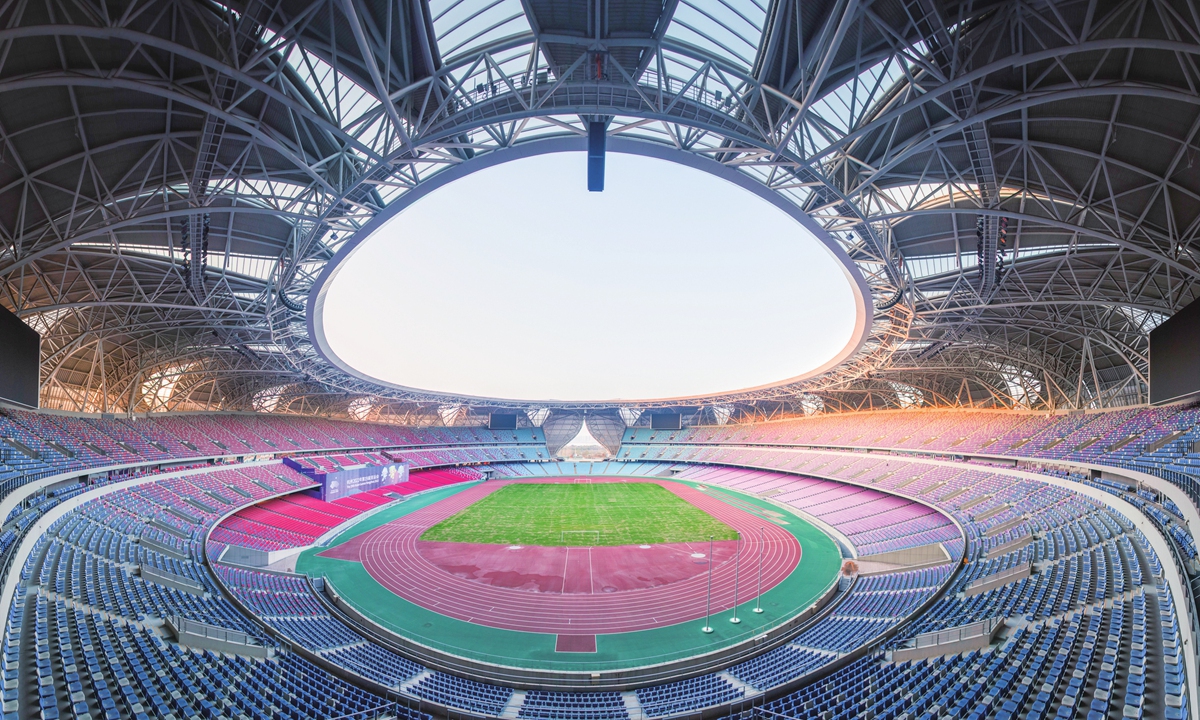Chinese companies showcase technological advances at Hangzhou Asian Games, highlighting nation’s success in digital realm, innovation

The Hangzhou Olympic Sports Center Stadium, the main venue of the Hangzhou Asian Games Photo: VCG
Chinese companies are actively taking part in the 19th Asian Games in Hangzhou, East China's Zhejiang Province, integrating their advanced digital technologies and intelligent applications into event services, venue designs and visitors' experiences, highlighting China's achievements in the digital realm and innovation.
Industry experts said that the growing technical presence reflects China's strength and progress in the field of technology, as well as its determination and achievements in driving innovation-led development.
The participation of internet technology companies as sponsors in this edition of the Asian Games, also known as Asiad, is higher than in major sporting events.
Among the 11 official partners, five are internet technology companies - China Mobile, Alibaba, Alipay, China Telecom and DAS-Security - according the official website of the 19th Asian Games.
More internet companies have become involved in the Asian Games. According to statistics from finance social media outlet "Financial Story Collection," the number of sponsorships from internet companies for the Hangzhou Asian Games has more than doubled from the 2010 Guangzhou Asian Games.
Supported by cutting-edge technologies such as 5G, the Internet of Things, big data and artificial intelligence (AI), the Hangzhou Asian Games has witnessed the emergence of several groundbreaking and innovative applications and technologies.
For instance, the Asian Games edition of Dingtalk, a digital management platform developed by Alibaba, is the world's first large-scale sports event integrated platform. It can provide online collaborative event management services for hundreds of thousands of event staff and volunteers, the Global Times learned from Alibaba on Sunday.
The sports venues and telecommunication equipment are also empowered by Chinese technology companies.
Mobile digital communication company Hytera has provided dedicated communication network plans for major venues, routes, the Hangzhou Xiaoshan International Airport and the Airport Expressway, using domestically developed and controllable wireless communication solutions.
Additionally, as a leading enterprise in the light-emitting diode industry, Unilumin has provided a variety of high-quality display products and control systems with a total area exceeding 4,200 square meters.
Many technology companies have contributed to enhancing the spectator experience. AI software company SenseTime offers a range of AI technologies and solutions to provide immersive viewing experiences for athletes and spectators at the Asian Games.
Spectators can use their smartphones to scan and have virtual interactions with the Asian Games' mascot. Users can also reach their destinations with just one click through augmented reality (AR) powered real-time navigation.
SenseTime has also developed an AR smart bus for the Asian Games that enables passengers to experience the safety and efficiency brought by Level 4 autonomous driving technology. The large screens inside the bus overlay Hangzhou's historical and cultural elements with real-time scenery, providing a fun experience that blurs the line between reality and virtuality.

An AR shuttle bus from SenseTime Photo: Courtesy of SenseTime
Ilario Corna, chief information technology officer of the International Olympic Committee, said that the Asiad will provide a window through which the world can learn more about Hangzhou, a city empowered by digital technologies.
The significant participation of technology companies in the Hangzhou Asian Games, along with the use of cutting-edge technologies, reflects China's achievement in the digital sector and its innovative strength and progress in the fields of science and technology, Liu Dingding, an independent tech observer, told the Global Times on Sunday.
By the end of 2022, China had built and opened 2.312 million 5G base stations with 561 million users, accounting for more than 60 percent of the global total. Additionally, 110 cities in the country had achieved gigabit network connectivity, reaching 500 million households, according to the Digital China Development Report 2022.
It also reflects the effectiveness of China's innovation-driven development policy as the government has been actively supporting technological innovation and research and development, Hong Yong, an expert at the digital real economies integration Forum 50, told the Global Times on Sunday.
The increase of internet technology companies' presence at the Asian Games reflects China's comprehensive strength and international influence in the fields of technology and sports, Hong added.
Research and development expenditure in China exceeded 3 trillion yuan for the first time in 2022 to reach 3.08 trillion yuan ($422 billion).

